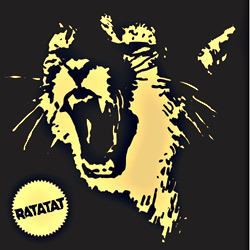Ratatat
Classics
(XL Recordings)
Remember how the indie-rock masses wept with joy when the Postal Service’s Give Up spontaneously combusted in their iPods? Classics, the second album by Brooklyn duo Ratatat, should have a similar effect, only ditch Ben Gibbard’s completely unironic vocals and insert spacious arena-rock guitars spread over angular beats and keyboard nostalgia in their place. It’s the Notwist meet Daft Punk, but it’s also melancholy instrumental dance music without so much as a hint of infinite sadness. But what’s with the cocksure album title? Even if all 10 songs on the album are justifiable hits—which they are—why aren’t the arrogance alarms sending domesticated animals under beds and into basements? Simple, really: irony. If you think about it, today’s indie-rock and hipster culture would be a much different beast without it. And while the seemingly ridiculous algorithm that makes up Ratatat’s music seems a bit too ironic, the term “good idea” is entirely more accurate. Weep if you need to: Everyone else will be too busy dancing to notice. DREW BIXBY
Ratatat play El Corazon, 109 Eastlake Ave. E., 206-381-3094, www.elcorazonseattle.com. $12. All ages. 7 p.m. Fri., Sept. 15.
Glue
Catch as Catch Can
(Fat Beats)
Their Fat Beats debut finds Glue striving for collective perfection. If anything resonates from emcee Adeem’s title as the only two-time Scribble Jam champion, it’s his preference for packing lyrics into tight spaces. They’re not battle rhymes anymore, but each line is delivered so pointedly there is little chance for botched translation. Maker’s production can only be described as drum heavy, where soul samples extend just long enough to be violently chopped by thunderous beats. By the time turntablist djdq adds his layer, it’s easy to get lost in scratches that further elevate the mood. “A Lot to Say” is a straightforward, determined narrative (“Tell a friend what you heard/Glue is on the way/With a budget of zero and 50 shows to play”), while “Never Really Know” shows the emcee caught off guard, yet largely decisive (“You lose what you love/You bruise when you touch/But with her I wouldn’t have it any other way”). But even with such precision, they’re individually talented enough to push less and give it all a chance to stick. EMILY YOUSSEF
Catfish Haven
Tell Me
(Secretly Canadian)
With the Windy City’s Catfish Haven, it’s hard to tell what’s more striking: the somewhat unfortunate band name (taken from the trailer park the band’s members grew up in), or their intriguing hybrid of Chicago soul, garage, and rural swamp music. On their debut long player, Tell Me, it’s definitely the latter, although grit, boogie, and heart attack could just as easily describe this incredibly derelict rawness. It’s innovative, but it’s also confusing. Is the band more Otis Redding or Tony Hawk? Both seem likely. Secretly Canadian plugs Tell Me as a modern-day breakup record, which works, but it’s live that Catfish Haven become worth their salt—I’ve seen them play a North Side Chicago club; they were so good (the fits and starts, the cursory guitar solos, the back-beat preaching) they should have been playing the beaten South Side for sheer drama. The gestalt of the band’s live show doesn’t add up on Tell Me, but taken as a soul-rock opera, Tell Me says one of two critical things: See this band live, or play the whole side through, and take the pain and predilections in stride. CHRIS COOMEY
OutKast
Idlewild
(La Face)
Although this new OutKast album emerges simultaneously with (and bears the same name as) the group’s long-awaited cinematic debut, the Idlewild CD is less a soundtrack than it is a proper stand-alone record. Truth be told, many of the songs in the film actually come from OutKast’s 10 million–plus selling, double full-length Speakerboxxx/The Love Below—the brooding “She Lives in My Lap” and funky chicken–evoking “Rooster” getting infused with fresh life on the silver screen. Those specific tunes are also the starting points for OutKast’s new material; Big Boi’s contributions continue along a rousing groove (check the catchy singing from Sleepy Brown and Scar—backed by a marching band—in Big’s “Morris Brown”). Meanwhile, Andre uses minor-key melodies and abstract digital and guitar rhythms to explore more introverted moods and, in such Hurricane Katrina–referencing songs as “Hollywood Divorce,” “Idlewild Blues,” and “Mutron Angel,” forlorn territory. There are no easy or obvious hits here, and while “Morris Brown” comes closest to a chart grabber, nothing matches The Love Below‘s ubiquitous “Hey Ya!” Although OutKast continue to be one of music’s more forward- thinking acts, their latest release shows no dramatic departures from the group’s general electronic funk genre-bending. TAMARA PALMER




